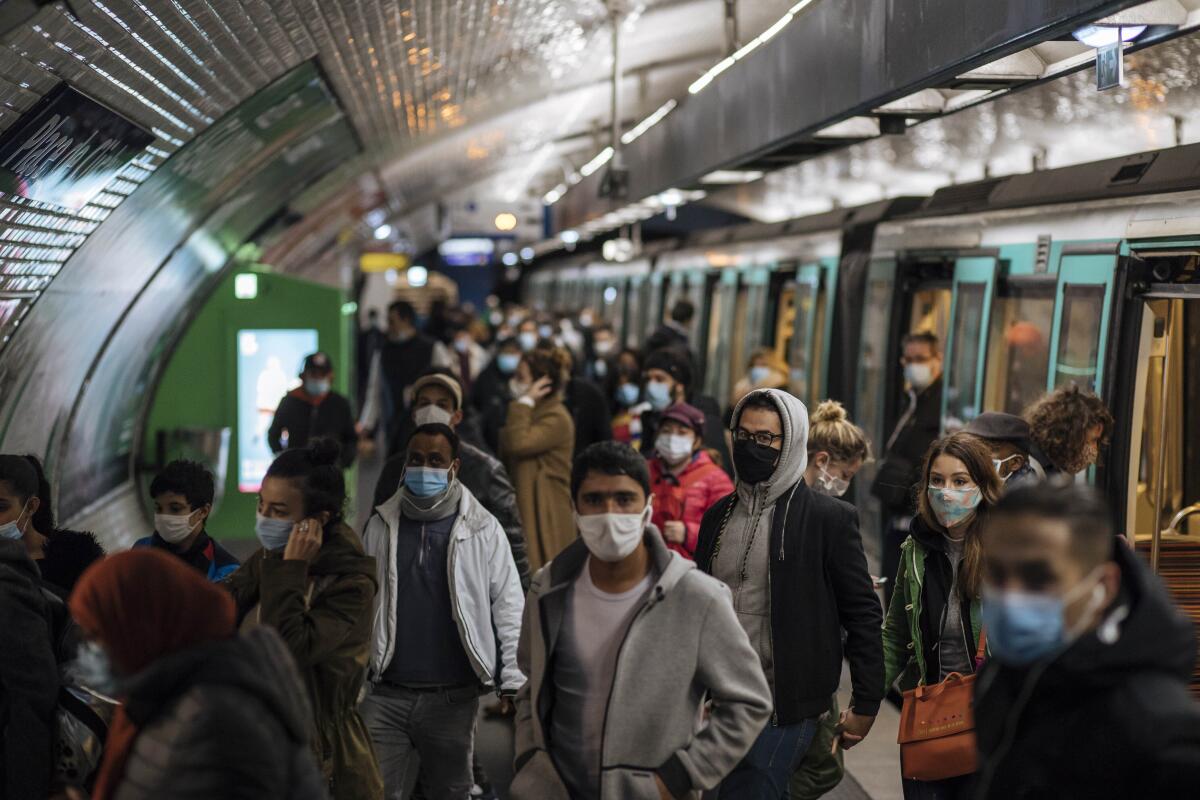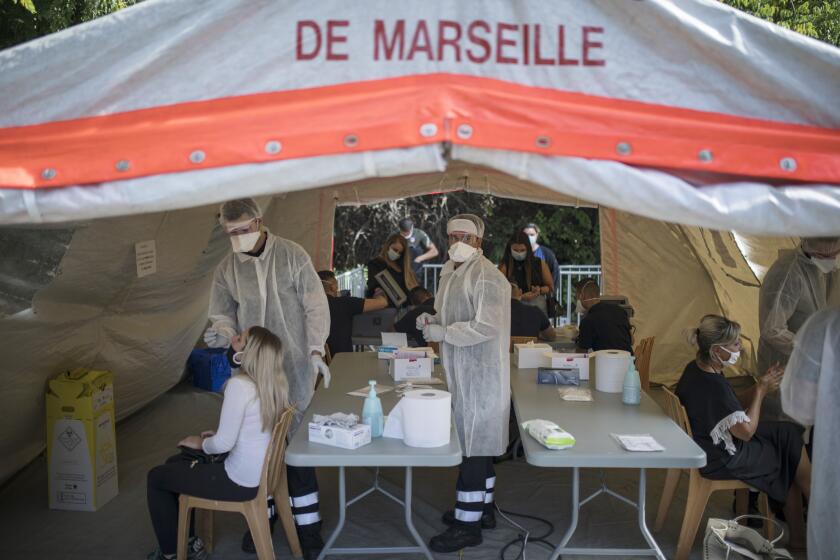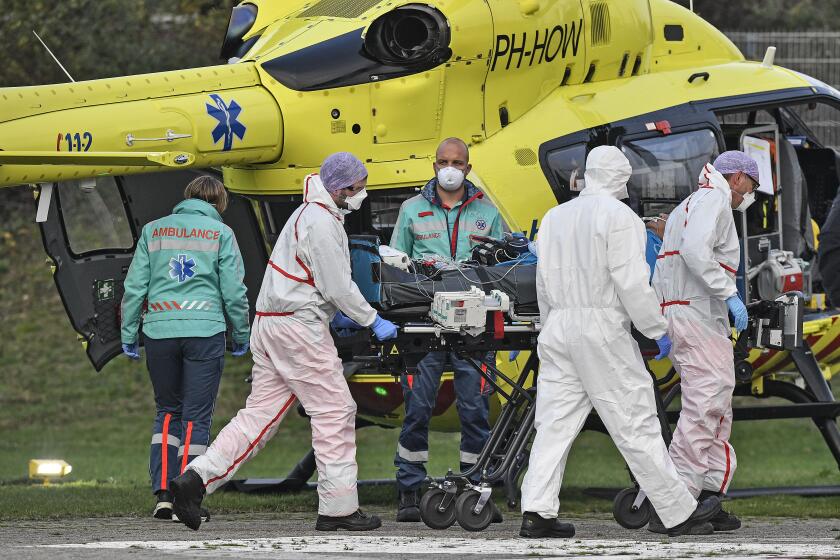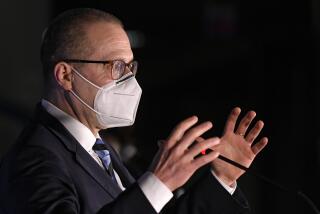France has ‘lost control’ of coronavirus, doctor warns, as Europe wrestles with big second wave

A French doctor warned Monday that his country has “lost control of the epidemic,” a day after health authorities reported more than 52,000 new coronavirus cases and as nations across Europe enact more sweeping restrictions to try to slow surging infection rates.
Spain — the first European country to surpass 1 million confirmed COVID-19 cases — declared a state of emergency Sunday and imposed a nationwide overnight curfew, a cap of six people on social gatherings and possible travel bans in and out of the hardest-hit regions.
The effect was clear on Barcelona’s famed Las Ramblas promenade, which was deserted Sunday night when it normally would have been teeming with people.
In Italy, new coronavirus restrictions went into effect Monday, including the closure of gyms, pools and movie theaters and early curfews on indoor dining in cafes and restaurants. Residents must also continue wearing masks outdoors.
In France, Dr. Jean-François Delfraissy, president of the scientific council that advises the French government on the coronavirus, said the country is in a “very difficult, even critical situation.”
“There probably are more than 50,000 new cases every day. Our estimate at the scientific council is closer to 100,000,” Delfraissy told RTL radio. “Between those who aren’t tested and asymptomatic patients, we’re close to that number of cases. This means the virus is spreading extremely fast.”
France has recorded over 1 million confirmed coronavirus cases since the pandemic’s start, the second country in Western Europe to reach that number.
Dr. Eric Caumes, head of infections and tropical diseases department at Paris’ Pitie-Salpetriere Hospital, said the country needs to lock down again. France declared a state of emergency earlier this month and has been imposing more and more restrictions since September to try to ease the pressure on hospitals, where COVID-19 patients occupy more than half of all ICU beds.
“We lost control of the epidemic, but that doesn’t date from yesterday,” he said on broadcaster Franceinfo. “We lost control of the epidemic several weeks ago already.”
Europe’s confirmed death toll has surpassed 250,000, according to a count by Johns Hopkins University, which puts the global toll at more than 1.1 million.
Italy was the first country in the West to get slammed by COVID-19. Its new measures also bar indoor and outdoor gatherings, including those for religious reasons, and the government is strongly recommending that people avoid having house guests and traveling in the country except for work, health or other necessities.
In spring, European countries tried to tamp down COVID-19 with nationwide lockdowns. There’s little appetite for that now.
Milan trattoria owner Giuseppe Di Terlizzi fears the worst as he is forced to close in the evenings after already losing lunchtime customers because so many people work from home.
“We have high costs and almost zero revenue,” he said Sunday. “So it will be a disaster. If they don’t help us, it will be the death of the restaurant business in Milan.”
Italy has been registering around 20,000 new confirmed infections per day, and health authorities have warned that some hospital COVID-19 wards risk hitting saturation point in the next week or two.
British authorities are likely to tighten restrictions on more areas of the country this week, amid mixed signs of whether measures introduced in the last few weeks have helped curb a steep rise in infections.
A bright-yellow helicopter has flown a COVID-19 patient from the Netherlands to a German intensive care unit, the first such airlift since the pandemic first threatened to swamp Dutch hospitals.
Government scientific advisors say that there are some signs of a leveling-off since a three-tier system of restrictions came into force in England, but that it is too soon to be certain.
A large chunk of northern England, including the big cities of Liverpool, Manchester and Sheffield, has been placed in the top tier of “very high” risk, with pubs closed and people from different households barred from mixing.
Lawmakers in the Czech Republic, which has been one of the hardest-hit nations in the coronavirus’ resurgence in Europe, are set this week to approve a government plan to draft up to 300 military health personnel from NATO and EU countries to help treat the influx of patients.
They will help their Czech colleagues at Prague’s military hospital and at a field hospital for 500 patients that the armed forces finished setting up over the weekend at Prague’s exhibition ground. The first group of 28 National Guard doctors from the U.S. is expected to arrive later this week.
Croatia, where the tourism minister tested positive over the weekend, is looking for help closer to home, urging retired doctors and medical students to join the fight against the coronavirus. Authorities also are preparing the main indoor arena in the capital, Zagreb, as a potential makeshift COVID-19 hospital as hospitals fill with new coronavirus patients.
And in Germany, which was lauded for its initial response to the coronavirus, the rising caseload prompted Chancellor Angela Merkel’s party Monday to delay for the second time a decision on who will become its new leader. Whoever wins the Christian Democratic Union’s leadership contest will be in a position to become the center-right candidate campaigning to succeed Merkel as chancellor in a national election expected in the fall of 2021.
More to Read
Start your day right
Sign up for Essential California for news, features and recommendations from the L.A. Times and beyond in your inbox six days a week.
You may occasionally receive promotional content from the Los Angeles Times.








